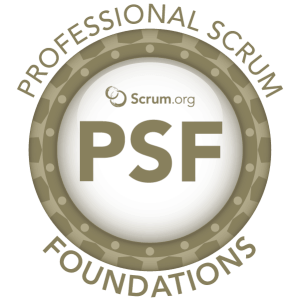Scrum.org?offers different courses to provide you the best learning experience based on your focus of Scrum. The variety of courses makes choosing the best course difficult sometimes.

This blog post aims at helping you choose the best course for you. We will look at the differences between the Professional Scrum Foundations (PSF) and the Professional Scrum Master (PSM) course, as these are the two courses we get the most questions about. We will provide guidelines to help you decide whether to attend PSF or PSM. Later, we might expand these guidelines to cover other courses as well.
Professional Scrum Foundations (PSF):
In the Professional Scrum Foundations (PSF) course, you will explore Scrum as part of a Scrum Team, creating a product through a series of Sprints while learning all about the Scrum Framework, its roles, events, artifacts, rules and values.
The PSF course is right for you if:
- You would like to create a shared learning experience among your team, so that you can jump-start or improve as a Scrum Team
- You are a stakeholder to Scrum Teams and would like to better understand what to expect of them and how to support the team
- You are a manager to Scrum Teams and would like to understand how you can support them in maximizing customer value
- You are in HR and would like to understand Scrum better to help find the best candidates for Scrum Teams
- You are about to join a Scrum Team as a Product Owner, Scrum Master or member of a Development Team. Before attending a course specifically catering towards one of the three Scrum roles, PSF will help you understand the foundations of Scrum that the other courses are based on.
- You would like to reboot your understanding of Scrum, e.g. to understand why your earlier experience wasn’t as much about Scrum as you thought
- You are interested in learning about Scrum. You’ve heard or read about Scrum but have never experienced Scrum first-hand before
- You have first-hand Scrum experience but you haven’t attended Scrum training before, and you are looking for training to solidify your understanding of Scrum
- Your organization is interested in “next steps” on your Scrum implementation
- Your team has just started working together and wants an opportunity to learn and bond together
Professional Scrum Master (PSM):
The Professional Scrum Master (PSM) course is for those who already know about the Scrum framework and want to gain an in-depth understanding of its principles, process theory, professional Scrum and how to use the elements as a Scrum Master to be a servant leader to the Scrum Team.
The PSM course is right for you if:
- You attended the PSF and have a good understanding of the Scrum Framework. You would like to explore the role of the Scrum Master in depth
- You have hands-on Scrum experience but not as a Scrum Master
- You have some practical experience as a Scrum Master and you feel there’s more to the role than facilitating Scrum events
- You are a Scrum Master to a Development Team struggling to regularly deliver a done Increment in every Sprint. You would like to learn how to use servant leadership, empiricism and self-organization to help your Development Team grow and deliver a done Increment regularly
- You are a Scrum Master who wants to better support their Product Owner in communicating and working towards products of value through better Product Backlog and stakeholder management
- You are a Scrum Master looking for concepts and ideas to help stakeholders understand and support Scrum
What both courses PSF and PSM will offer:
Both courses, PSF and PSM, will provide you an amazing 2-day learning experience – just with different breadth and depth. Both courses come with high-quality course material and a code to the PSM I assessment. That’s right, the PSF will enable you to take the PSM I assessment, too. If you take the assessment within 14 days after PSF or PSM and you do not pass, you will get a second assessment attempt for free.
Business & Finance Articles on Business 2 Community
(62)